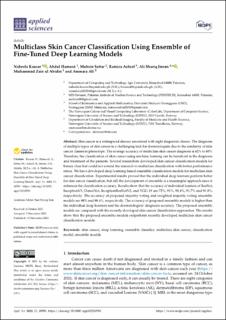| dc.description.abstract | Skin cancer is a widespread disease associated with eight diagnostic classes. The diagnosis of multiple types of skin cancer is a challenging task for dermatologists due to the similarity of skin cancer classes in phenotype. The average accuracy of multiclass skin cancer diagnosis is 62% to 80%. Therefore, the classification of skin cancer using machine learning can be beneficial in the diagnosis and treatment of the patients. Several researchers developed skin cancer classification models for binary class but could not extend the research to multiclass classification with better performance ratios. We have developed deep learning-based ensemble classification models for multiclass skin cancer classification. Experimental results proved that the individual deep learners perform better for skin cancer classification, but still the development of ensemble is a meaningful approach since it enhances the classification accuracy. Results show that the accuracy of individual learners of ResNet, InceptionV3, DenseNet, InceptionResNetV2, and VGG-19 are 72%, 91%, 91.4%, 91.7% and 91.8%, respectively. The accuracy of proposed majority voting and weighted majority voting ensemble models are 98% and 98.6%, respectively. The accuracy of proposed ensemble models is higher than the individual deep learners and the dermatologists’ diagnosis accuracy. The proposed ensemble models are compared with the recently developed skin cancer classification approaches. The results show that the proposed ensemble models outperform recently developed multiclass skin cancer classification models. | en_US |

